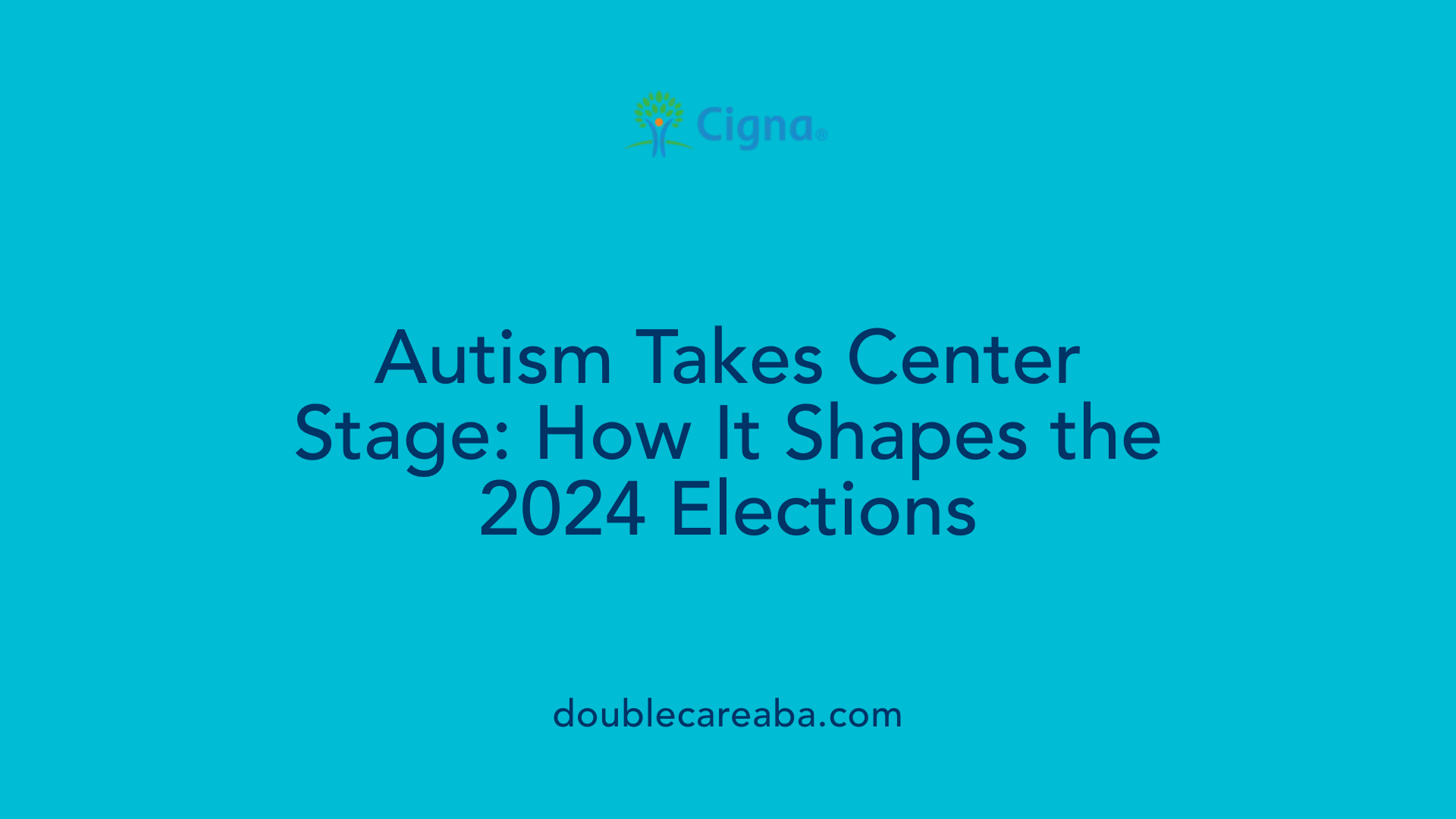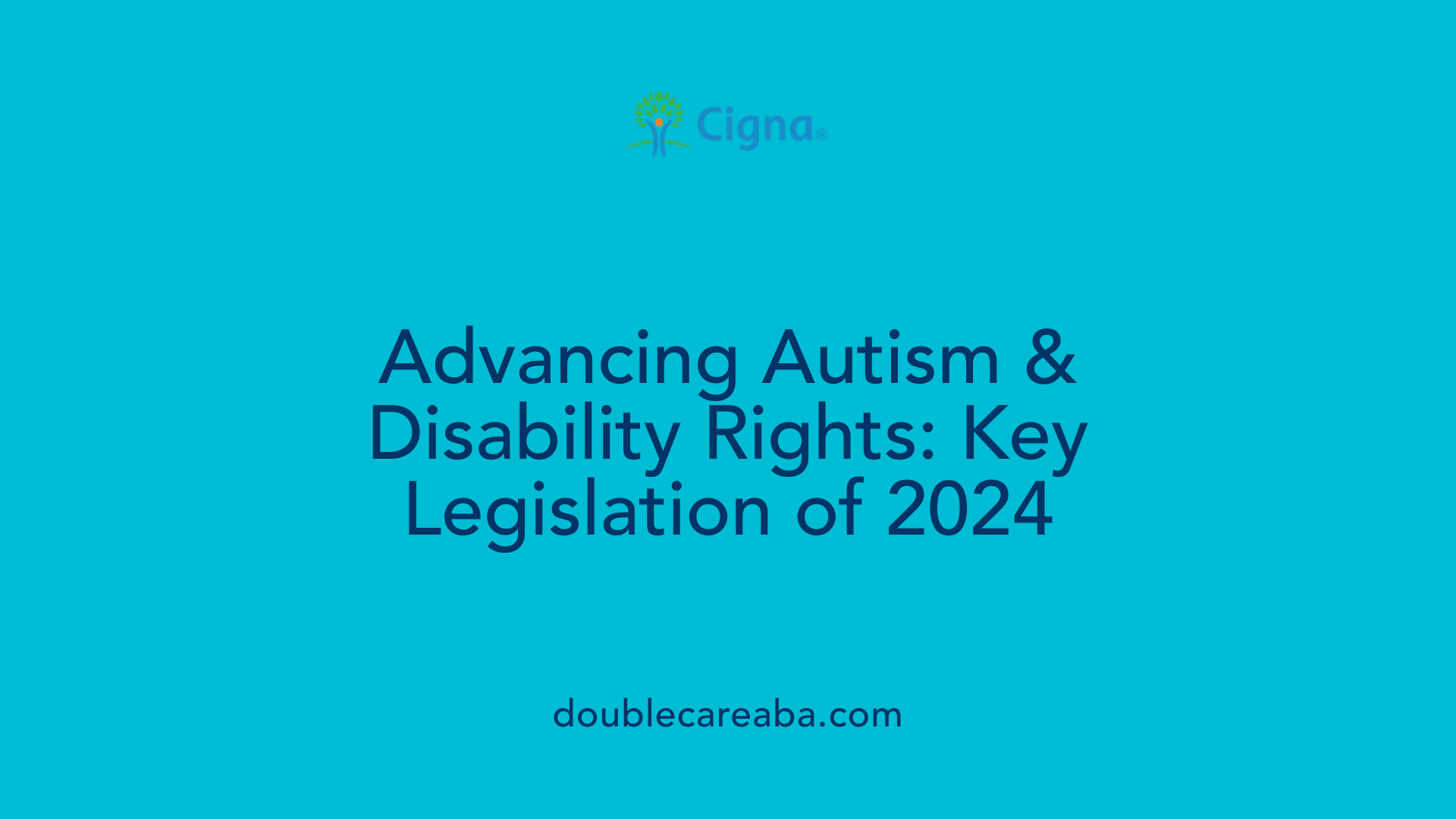The Rising Profile of Autism in US Politics
As the 2024 presidential election approaches, autism and disability rights have emerged as prominent issues shaping political discourse and policy proposals. From legislative initiatives to voting access, the concerns of the disability community are now at the forefront, influencing candidates' platforms and public debate.
Autism’s Increasing Prominence on the Political Stage

How is autism influencing the 2024 election and political platforms?
Autism has become a significant issue in the 2024 election, contributing to broader discussions about disability rights, healthcare, and society’s inclusiveness. Candidates are now addressing neurodiversity by including proposals that fund early intervention programs, autism research, and lifespan support services. Legislation like the Autism CARES Act of 2024 underscores the government’s commitment to advancing understanding and support for autistic individuals. The advocacy community, such as Vote the Spectrum, actively promotes voting rights and accessibility for individuals with autism and other disabilities. Policies are increasingly emphasizing the need for accessible polling stations, assistance during voting, and safeguards to prevent disenfranchisement. Overall, autism’s rising prominence is reshaping political priorities, highlighting the importance of inclusive policies that recognize the needs and rights of neurodiverse populations.
What role does autism advocacy play in the 2024 electoral discussions?
Advocacy organizations are pivotal in shaping the 2024 electoral landscape. Groups like Autism Speaks and the Autistic Self Advocacy Network (ASAN) have successfully lobbied for increased federal funding, leading to the reauthorization of the Autism CARES Act, which allocates over $2 billion for autism-related research and services through 2029. These organizations work tirelessly to raise awareness about voting barriers faced by autistic individuals, providing tailored resources, voter registration guides, and accessibility tools. Efforts include promoting awareness about the need for polling place accommodations such as sensory-friendly environments and assistive voting devices. By advocating for anti-discrimination laws and better healthcare access, these groups ensure that policy discussions prioritize the well-being, rights, and participation of autistic and disabled voters. Their influence is vital in encouraging political candidates to incorporate disability-inclusive policies into their platforms.
Are there any legislative actions or policy reforms related to autism and disability rights happening in the context of the 2024 election?
Yes, 2024 has seen notable legislative and policy developments focused on autism and disability rights. The reauthorization and expansion of the Autism CARES Act, signed into law during this cycle, is central, with provisions supporting research, screening, and support services for all ages. Additionally, regulations enacted in April 2024 have strengthened nondiscrimination policies across healthcare, education, and social services. These include mandates for accessible communication supports, anti-discrimination protections, and better enforcement of disability rights laws. Recent proposals also aim to eliminate harmful practices such as subminimum wages for workers with disabilities under programs like 14c, aligning with broader efforts to promote inclusive employment. These reforms reinforce the federal government’s focus on fostering a society that recognizes neurodiversity and protects the rights of individuals with disabilities, making disability policy a prominent theme in the election discussion.
How do voting rights and accommodations for voters with disabilities, including those on the autism spectrum, feature in the 2024 election?
Voting accessibility remains a critical issue for voters with disabilities, including those who are autistic. Federal laws like the Americans with Disabilities Act (ADA) and the Help America Vote Act (HAVA) mandate accessible voting options and facilities. States are implementing various accommodations, such as tactile voting devices, visual and audio ballot options, and assistive technologies. For instance, Georgia’s voting system includes adjustable controls, headset support, and an app for visually impaired voters to read ballots. Voters needing help can receive assistance from trained poll workers or designated helpers, ensuring privacy and dignity. Efforts are ongoing to safeguard voting rights, oppose restrictive legislation, and expand accessible voting mechanisms. Ensuring every eligible voter can participate independently and confidently remains a priority in the electoral process, especially during a year where disability participation issues are prominently debated.
Are there debates or controversies related to autism, such as vaccination policies, in the 2024 presidential race?
Autism-related controversies, particularly surrounding vaccination policies, continue to stir debates in 2024. Despite overwhelming scientific evidence discrediting a link between vaccines and autism, some political candidates question vaccine safety and advocate for looser vaccination mandates. This controversy persists partly due to misinformation and historic debates initiated by discredited studies, such as Wakefield’s 1998 research. Candidates’ positions on vaccine mandates influence public perceptions and policy discussions, affecting funding priorities and healthcare recommendations. While some candidates support continued vaccination programs, others emphasize parental choice and question the safety of vaccines, especially those administered in childhood. Public discourse often combines concerns about vaccine safety with broader issues of healthcare access, research funding, and the rights of individuals and families affected by autism. This ongoing debate plays a significant role in shaping the tone and substance of the 2024 election’s coverage of autism issues.
Legislative and Policy Advancements Supporting Autism and Disability Rights

Are there any legislative actions or policy reforms related to autism and disability rights happening in the context of the 2024 election?
Several prominent legislative and policy initiatives are shaping the landscape of autism and disability rights in this election year. A notable example is the passage of the Autism CARES Act of 2024, which was both passed by the House and signed into law by President Biden. This legislation reauthorizes federal funding of over $2 billion dedicated to autism research, healthcare services, and support programs through 2029.
The Autism CARES Act emphasizes expanding research on autism spectrum disorder, improving services for individuals across all stages of life, and enhancing communication and support tools for non-speaking or minimally verbal autistic individuals.
In addition, regulatory agencies implemented new rules in April 2024 that advance healthcare nondiscrimination, improve accessibility, and bolster protections for people with disabilities across different federal programs, including Medicaid, Social Security, and education. These actions demonstrate a renewed federal commitment to advancing autism and disability rights during this election cycle, reflecting a comprehensive approach that combines legislation, regulation, and funding priorities.
What are the implications of potential policy shifts following the 2024 election?
The outcomes of the 2024 election could lead to significant adjustments in disability support systems and autism services. Advocates are particularly concerned about potential cuts or restructuring of critical programs such as Medicaid, Medicare, Social Security Disability Insurance, and SNAP benefits. These programs are lifelines enabling many disabled individuals to access healthcare, maintain independence, and secure basic needs.
Another major concern is the possible abolition or severe reduction of the Department of Education, which plays a key role in protecting the civil rights of disabled students and ensuring their access to quality education. Such a move could jeopardize decades of progress in inclusive education and legal protections mandated through laws like the Individuals with Disabilities Education Act (IDEA).
Proposals outlined in the Policy Blueprint Project 2025, associated with conservative policy initiatives, suggest restructuring Medicaid, imposing lifetime limits on benefits, and scaling back protections under the Americans with Disabilities Act (ADA). These potential shifts threaten to undermine the autonomy and well-being of disabled populations, risking increased disparities and social marginalization.
Stakeholders, including advocacy groups and disabled individuals, emphasize the importance of vigilance and continued activism to protect these gains and prevent regression.
How might drastic policy changes influence the societal perception of disability and autism?
Significant policy reforms post-2024 have the potential to influence societal attitudes toward disability and autism profoundly. If policies erode protections and reduce access to services, societal perceptions may shift toward viewing disabled people as burdens rather than equal members of society. This can reinforce harmful stereotypes and normalize exclusion, impacting how communities understand and support neurodiversity.
In contrast, maintaining or expanding supportive policies promotes inclusive narratives that recognize the strengths and rights of autistic and disabled individuals. Such policies foster public understanding, reduce stigma, and encourage societal acceptance.
Furthermore, negative attitudes—manifested in tasteless jokes or dismissive behaviors—may become more prevalent if systemic support diminishes. Conversely, proactive advocacy and robust awareness campaigns can help counteract these trends, shaping a culture that values diversity and prioritizes accessibility.
In summary, the direction of policy changes following the election will influence not only access and rights but also societal attitudes, shaping perceptions of disability and neurodiversity for years to come.
| Topic | Details | Additional Context |
|---|---|---|
| Autism CARES Act 2024 | Reauthors over $2 billion for autism research and services | Focuses on lifespan support and communication tools |
| Healthcare Protections | New federal rules in April 2024 for nondiscrimination and accessibility | Cover programs like Medicaid, Social Security, and education |
| Policy Blueprint 2025 | Proposed restructuring of Medicaid, lifetime limits, and reduced protections | Associated with conservative policy initiatives |
| Societal Attitudes | Impact of policy shifts on perceptions of disability and neurodiversity | Influences stigma, inclusion, and public understanding |
This overview underscores the importance of ongoing legislative efforts and societal awareness in shaping the future of disability rights amid the evolving political landscape.
Looking Ahead: The Future of Autism and Disability Rights
The 2024 election marks a critical juncture for autism and disability rights in the United States. With new legislation, policy debates, and advocacy efforts shaping the landscape, the outcomes will influence access to healthcare, education, voting, and social inclusion for millions. While challenges remain—particularly regarding potential policy reversals and societal attitudes—this election provides an opportunity for transformative reforms that recognize the vital contributions and rights of neurodiverse individuals. Moving forward, sustained advocacy, informed voting, and inclusive policymaking will be essential to ensure that progress continues and that all Americans with disabilities are empowered to participate fully in society.
References
- What Disabled People You Know May Be Thinking After ...
- Help us improve the autistic voting experience
- People With Disabilities: 2024 Election Can Reshape The ...
- What Trump's Win Could Mean For Medicaid, Disability ...
- Voting Assistance for People with Disabilities
- Donald Trump | Breaking News & Latest Updates
- Trump says there are 'problems' with vaccines, rejects ...
- 2024 Election Resources
- 2024 Advocacy Highlights
- Together, we will fight for our communities













